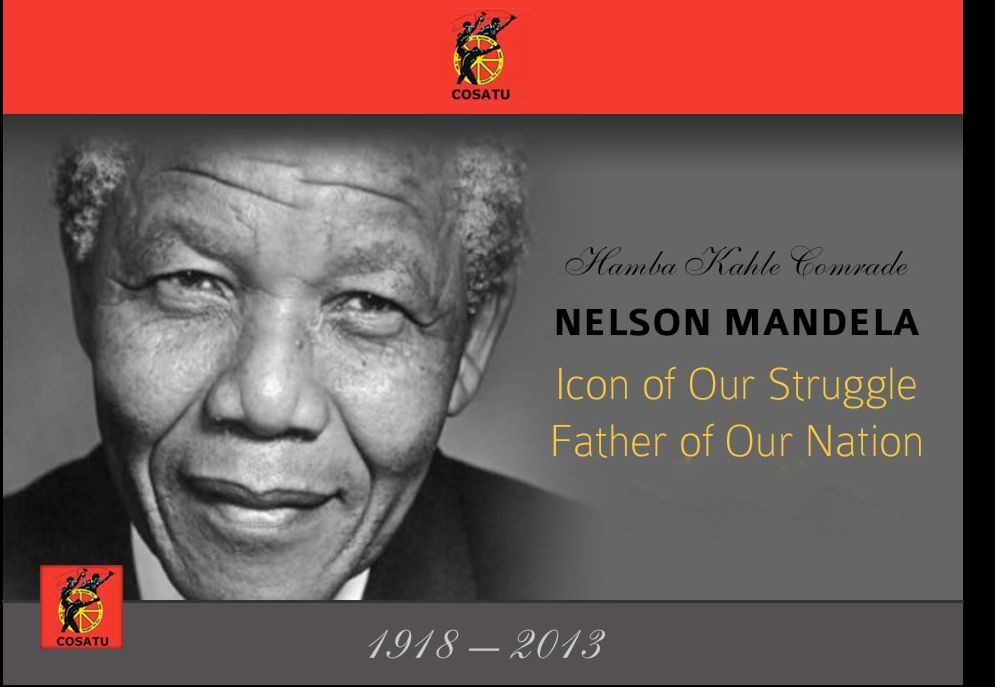11 December, 2013At the state memorial service for Nelson Mandela it seemed like even the heavens were in mourning. A grey sombre day, with a steady stream of wet tears from the sky blurring the cameras as one dignitary after another from around the world paid tribute to this great man. Never before has the loss of a leader been mourned the world over, and probably never again.
Nelson Rolihlahla Mandela, the greatest statesman that ever lived, is a world icon and yet he symbolised different things to different people. He is a symbol of triumph, where a village herd boy can grow up to challenge a repressive government and change the course of history. A symbol of struggle; organising for political change through the formation and leadership of structures of the African National Congress, including its military wing Umkhonto we Sizwe. A symbol of courage; having spent his early life enduring harassment and incarceration, yet even whilst in prison on a life sentence his name rallied people to fight for freedom. A symbol of reconciliation; when after spending 27 years in prison he delivered a nation out of an oppressive bloody regime on the power of forgiveness. A symbol of hope; using his powerful voice to speak out against injustice, human suffering, and to promote peace and wellbeing.
Mandela was not always universally respected. There was a time when the Tories in Britain publicly called for his hanging; he remained on the US terrorist watchlist until 2008; he was scorned for speaking out on the war in Iraq; for embracing Fidel Castro and acknowledging Cuba’s role in the struggle against apartheid; and for speaking out in defence of Palestine, saying that freedom in South Africa was incomplete without the freedom of the Palestinians.
A political giant, Mandela remained a man of the people. He acknowledged the role that organised labour palyed in ending apartheid, not only in South Africa but throughout the world. He understood that it was ordinary workers that stood up, stood together and stood in solidarity that created the masses to defeat apartheid.
Compromise for a new South Africa came at a price. Whilst Mandela believed in the rights of workers to prosper and lived dignified lives, the unstable macroeconomics left behind by apartheid required sacrificing the aspirations of the working class for economic stability. The newly democratic South Africa embraced neoliberalism and grounded its tenents in the economic framework adopted in 1996, the Growth, Employment and Redistribution policy, widely acknowledged to have entrenched inequality, unemployment and poverty that plagues South Africa today.
Yet he remains loved and honoured by the working class because he was a man of humility and principle. He acknowledged that the struggle of the working class was not over with the dawn of a new South Africa, and encouraged workers to hold the state accountable and fight for a more just South Africa.
The National Union of Mineworkers (NUM) bestowed on Mandela in 1980 the title of Lifetime Honorary President of the NUM. Today the NUM mourns “Mandela who has throughout sacrificed and dedicated his life for the good of the people of South Africa and the world will be solely missed as a global icon, a peace maker and a freedom fighter of note.” On his passing the NUM stated “he has been an inspiration through and through and has on many occasions motivated mineworkers to take education seriously as he believed that it is through it that their children will head mines.”
The National Union of Metalworkers of South Africa (Numsa) says “President Mandela will forever be admired and adored by the militant and fighting metalworkers of our country… President Mandela’s life touched many South Africans, young and old, black and white, because his life shone through our shared aspirations of a life of full human equality enshrined in the Freedom Charter. His outstanding contribution to our struggle for liberation, freedom, democracy and people’s power will be celebrated by many generations to come.”
Mandela’s death comes at a time when there is more than grief in the dark clouds that have gathered in the South African skies. There are divisions and disillusionment in many quarters, yet the country remains deeply democratic. Mandela’s legacy is the legacy of millions of South Africans that contributed to its making.
Numsa calls for renewed struggle to honour him; “The passing on of President Mandela marks the end of a political era in our journey towards full freedom. To truthfully and fully honour Mandela and his Comrades, President Mandela’s passing on must herald the birth of our renewal to intensify the struggle for full economic sovereignty, for complete economic freedom of the working class and the rural poor.”
The future is where we need to look to, says Frans Baleni, the NUM General Secretary; "As we dip our banners and celebrate the life and times of this stalwart, it is time that as South Africans we reflect on the legacy he left behind and the future we have to craft for generations to come".
As IndustriALL pays tribute to this great man and joins the world in mourning his death, we give Mandela the final word. “I have walked that long road to freedom. I have tried not to falter; I have made missteps along the way. But I have discovered the secret that after climbing a great hill, one only finds that there are many more hills to climb. I have taken a moment here to rest, to steal a view of the glorious vista that surrounds me, to look back on the distance I have come. But I can rest only for a moment, for with freedom comes responsibilities, and I dare not linger, for my long walk has not ended.”
Rest in peace our great struggle hero
